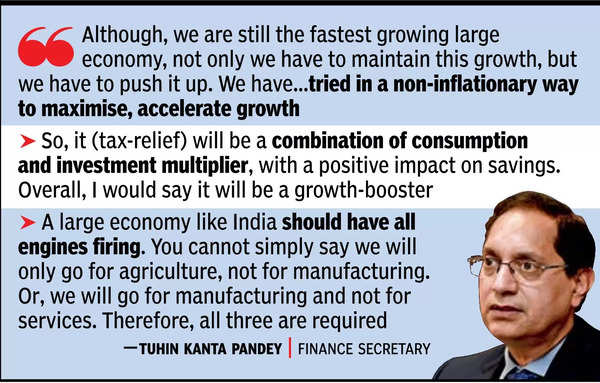Finance secretary Tuhin Kanta Pandey said the 2025-26 Budget has tried to push growth in a non-inflationary manner and has kept the promise of fiscal consolidation. In an interview to TOI,Pandey, who is also in charge of the revenue department, said the Budget has enabled all levers of growth to accelerate. Excepts:
Do you think the Budget has done enough to help accelerate growth against the backdrop of global uncertainties?
It is a pro-growth Budget. We have headwinds and we also have internal challenges. We have addressed both. Although, we are still the fastest growing large economy in the world, not only we have to maintain this growth, but we have to push it up. We have addressed both the supply-side and demand-side and tried in a non inflationary way to maximise growth, accelerate growth.
Is the time right for monetary authorities to play a part in accelerating growth, for example with a rate cut?
I think it’s up to the MPC (Monetary Policy Committee) to take a call on that. But, on the fiscal side, we have done our bit. We have kept the promise of fiscal consolidation. FM had announced that it will be 4.9% in this year and we have been able to achieve 4.8%. FM had said fiscal consolidation path will mean we’ll bring it to 4.5% next year. We are proposing 4.4% and there was also an announcement that thereafter we will have a glide path in terms of the debt-to-GDP level and a visibility would be given on how it will go forward. That has also been included in the FRBM statement.

So, has the Budget created conditions for a rate cut?
In a way, the Budget has provided whatever stimulations are required. We are not providing a stimulus at the cost of the deficit by increasing the deficit. So, we are giving sufficient sort of comfort to the monetary authority. However, they would have to take a call based on whatever.
Is the tax relief largely to boost consumption and address some of the concerns of the middle class?
I would say consumption is one part. However, we are not really prescribing how taxpayers, who have got this money back in a way, how they will behave. Basically, the decision making is transferred to taxpayers, who have got this relief. They may choose to consume, save or invest directly in either of the three situations we have. It will have a salutary and good effect on the economy because if they choose to consume, it will boost demand. If they choose to invest indirectly, they are supporting the banks to extend more credit. Because, banks can give credit only when they have got increased deposits. And, if they choose to directly invest, for example in a house, they also participate in investments. In that case, it will work like an investment multiplier anyway. So, it will be a combination of consumption and investment multiplier, with a positive impact on savings. Overall, I would say it will be a growth-booster.
Have other levers of economy got required attention, apart from consumption and investment?
A large economy like India has to have all engines firing. You cannot simply say we will only go for agriculture, not for manufacturing. Or, we will go for manufacturing and not for services. Therefore all three are required. If you see all the proposals on supply side, we have tried to see how we can speed up production, how we can speed up productivity and how we can spur employment. So, it is employment-led growth. In agriculture, we have taken steps to boost pulses productivity and increase credit limit for farmers. Everywhere we have said how we can boost production and productivity. We are saying let there be a growth path for MSMEs. Let there be more credit available for MSMEs. Let their participation in exports be more. Let there be more support for them in terms of innovation and research. Our tax policy is supporting labour intensive sectors.
When do you expect I-T bill to be presented in Parliament? How will it make life of the taxpayer simple?
It is proposed to be done before Feb 13. We are not changing the policy through it. The same thing will be carried forward because after passing, this bill will be applicable from a future date. We wanted to reform right away. So, those reforms have been brought in this bill through amendments. There are so many redundant provisions. There are a number of changes. More than 4,000 changes have happened since 1962, when this act was enacted. In 63 years, the finance sector changed, plus there were many taxation laws and amendment bills. Things get complicated to read and they may also create interpretation problems. There could be many interpretation problems or litigations. If you have more readability, if you have clarity, there will be less litigation.

